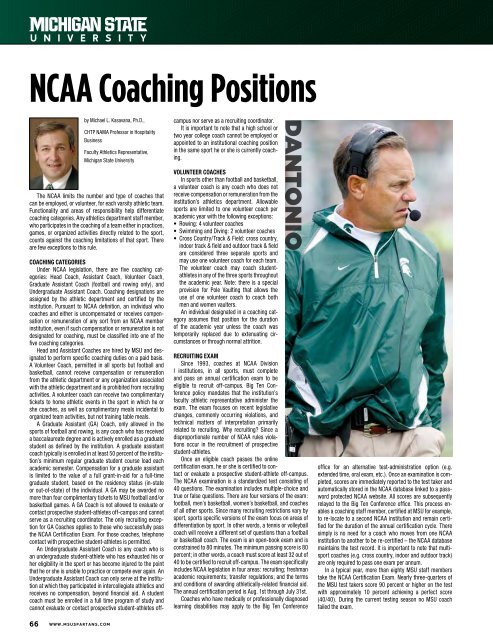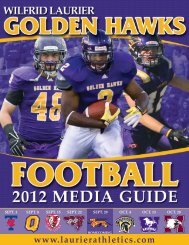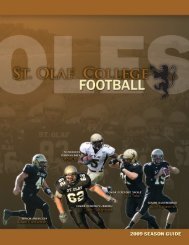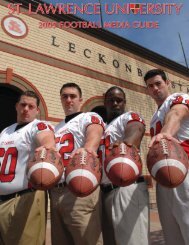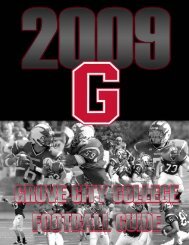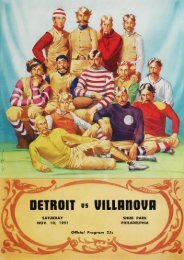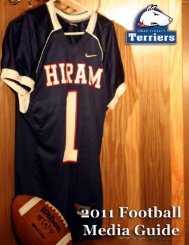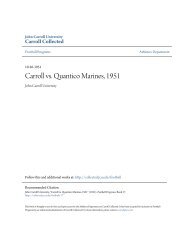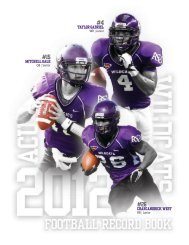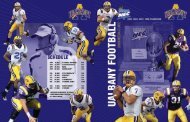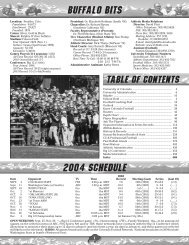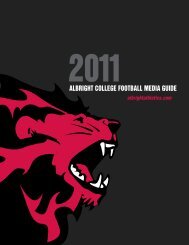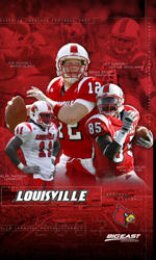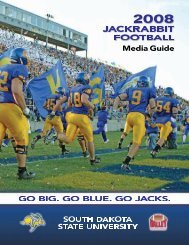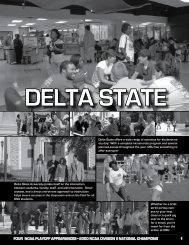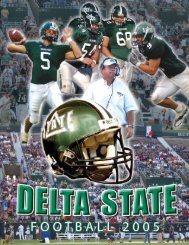msu spartan marching band 2010 - College Football Dvds-Media ...
msu spartan marching band 2010 - College Football Dvds-Media ...
msu spartan marching band 2010 - College Football Dvds-Media ...
You also want an ePaper? Increase the reach of your titles
YUMPU automatically turns print PDFs into web optimized ePapers that Google loves.
NCAA Coaching Positions<br />
The NCAA limits the number and type of coaches that<br />
can be employed, or volunteer, for each varsity athletic team.<br />
Functionality and areas of responsibility help differentiate<br />
coaching categories. Any athletics department staff member,<br />
who participates in the coaching of a team either in practices,<br />
games, or organized activities directly related to the sport,<br />
counts against the coaching limitations of that sport. There<br />
are few exceptions to this rule.<br />
CoaChing Categories<br />
Under NCAA legislation, there are five coaching categories:<br />
Head Coach, Assistant Coach, Volunteer Coach,<br />
Graduate Assistant Coach (football and rowing only), and<br />
Undergraduate Assistant Coach. Coaching designations are<br />
assigned by the athletic department and certified by the<br />
institution. Pursuant to NCAA definition, an individual who<br />
coaches and either is uncompensated or receives compensation<br />
or remuneration of any sort from an NCAA member<br />
institution, even if such compensation or remuneration is not<br />
designated for coaching, must be classified into one of the<br />
five coaching categories.<br />
Head and Assistant Coaches are hired by MSU and designated<br />
to perform specific coaching duties on a paid basis.<br />
A Volunteer Coach, permitted in all sports but football and<br />
basketball, cannot receive compensation or remuneration<br />
from the athletic department or any organization associated<br />
with the athletic department and is prohibited from recruiting<br />
activities. A volunteer coach can receive two complimentary<br />
tickets to home athletic events in the sport in which he or<br />
she coaches, as well as complimentary meals incidental to<br />
organized team activities, but not training table meals.<br />
A Graduate Assistant (GA) Coach, only allowed in the<br />
sports of football and rowing, is any coach who has received<br />
a baccalaureate degree and is actively enrolled as a graduate<br />
student as defined by the institution. A graduate assistant<br />
coach typically is enrolled in at least 50 percent of the institution’s<br />
minimum regular graduate student course load each<br />
academic semester. Compensation for a graduate assistant<br />
is limited to the value of a full grant-in-aid for a full-time<br />
graduate student, based on the residency status (in-state<br />
or out-of-state) of the individual. A GA may be awarded no<br />
more than four complimentary tickets to MSU football and/or<br />
basketball games. A GA Coach is not allowed to evaluate or<br />
contact prospective student-athletes off-campus and cannot<br />
serve as a recruiting coordinator. The only recruiting exception<br />
for GA Coaches applies to those who successfully pass<br />
the NCAA Certification Exam. For those coaches, telephone<br />
contact with prospective student-athletes is permitted.<br />
An Undergraduate Assistant Coach is any coach who is<br />
an undergraduate student-athlete who has exhausted his or<br />
her eligibility in the sport or has become injured to the point<br />
that he or she is unable to practice or compete ever again. An<br />
Undergraduate Assistant Coach can only serve at the institution<br />
at which they participated in intercollegiate athletics and<br />
receives no compensation, beyond financial aid. A student<br />
coach must be enrolled in a full time program of study and<br />
cannot evaluate or contact prospective student-athletes off-<br />
66 w w w . m s u s p a r t a n s . c o m<br />
by Michael L. Kasavana, Ph.D.,<br />
CHTP NAMA Professor in Hospitality<br />
Business<br />
Faculty Athletics Representative,<br />
Michigan State University<br />
campus nor serve as a recruiting coordinator.<br />
It is important to note that a high school or<br />
two year college coach cannot be employed or<br />
appointed to an institutional coaching position<br />
in the same sport he or she is currently coaching.<br />
Volunteer CoaChes<br />
In sports other than football and basketball,<br />
a volunteer coach is any coach who does not<br />
receive compensation or remuneration from the<br />
institution’s athletics department. Allowable<br />
sports are limited to one volunteer coach per<br />
academic year with the following exceptions:<br />
• Rowing: 4 volunteer coaches<br />
• Swimming and Diving: 2 volunteer coaches<br />
• Cross Country/Track & Field: cross country,<br />
indoor track & field and outdoor track & field<br />
are considered three separate sports and<br />
may use one volunteer coach for each team.<br />
The volunteer coach may coach studentathletes<br />
in any of the three sports throughout<br />
the academic year. Note: there is a special<br />
provision for Pole Vaulting that allows the<br />
use of one volunteer coach to coach both<br />
men and women vaulters.<br />
An individual designated in a coaching category<br />
assumes that position for the duration<br />
of the academic year unless the coach was<br />
temporarily replaced due to extenuating circumstances<br />
or through normal attrition.<br />
DANTONIO<br />
reCruiting exam<br />
Since 1993, coaches at NCAA Division<br />
I institutions, in all sports, must complete<br />
and pass an annual certification exam to be<br />
eligible to recruit off-campus. Big Ten Conference<br />
policy mandates that the institution’s<br />
faculty athletic representative administer the<br />
exam. The exam focuses on recent legislative<br />
changes, commonly occurring violations, and<br />
technical matters of interpretation primarily<br />
related to recruiting. Why recruiting? Since a<br />
disproportionate number of NCAA rules violations<br />
occur in the recruitment of prospective<br />
student-athletes.<br />
Once an eligible coach passes the online<br />
certification exam, he or she is certified to contact<br />
or evaluate a prospective student-athlete off-campus.<br />
The NCAA examination is a standardized test consisting of<br />
40 questions. The examination includes multiple-choice and<br />
true or false questions. There are four versions of the exam:<br />
football, men’s basketball, women’s basketball, and coaches<br />
of all other sports. Since many recruiting restrictions vary by<br />
sport, sports specific versions of the exam focus on areas of<br />
differentiation by sport. In other words, a tennis or volleyball<br />
coach will receive a different set of questions than a football<br />
or basketball coach. The exam is an open-book exam and is<br />
constrained to 80 minutes. The minimum passing score is 80<br />
percent; in other words, a coach must score at least 32 out of<br />
40 to be certified to recruit off-campus. The exam specifically<br />
includes NCAA legislation in four areas: recruiting; freshman<br />
academic requirements; transfer regulations; and the terms<br />
and conditions of awarding athletically-related financial aid.<br />
The annual certification period is Aug. 1st through July 31st.<br />
Coaches who have medically or professionally diagnosed<br />
learning disabilities may apply to the Big Ten Conference<br />
office for an alternative test-administration option (e.g.<br />
extended time, oral exam, etc.). Once an examination is completed,<br />
scores are immediately reported to the test taker and<br />
automatically stored in the NCAA database linked to a password<br />
protected NCAA website. All scores are subsequently<br />
relayed to the Big Ten Conference office. This process enables<br />
a coaching staff member, certified at MSU for example,<br />
to re-locate to a second NCAA institution and remain certified<br />
for the duration of the annual certification cycle. There<br />
simply is no need for a coach who moves from one NCAA<br />
institution to another to be re-certified – the NCAA database<br />
maintains the test record. It is important to note that multisport<br />
coaches (e.g. cross country, indoor and outdoor track)<br />
are only required to pass one exam per annum.<br />
In a typical year, more than eighty MSU staff members<br />
take the NCAA Certification Exam. Nearly three-quarters of<br />
the MSU test takers score 90 percent or higher on the test<br />
with approximately 10 percent achieving a perfect score<br />
(40/40). During the current testing season no MSU coach<br />
failed the exam.


